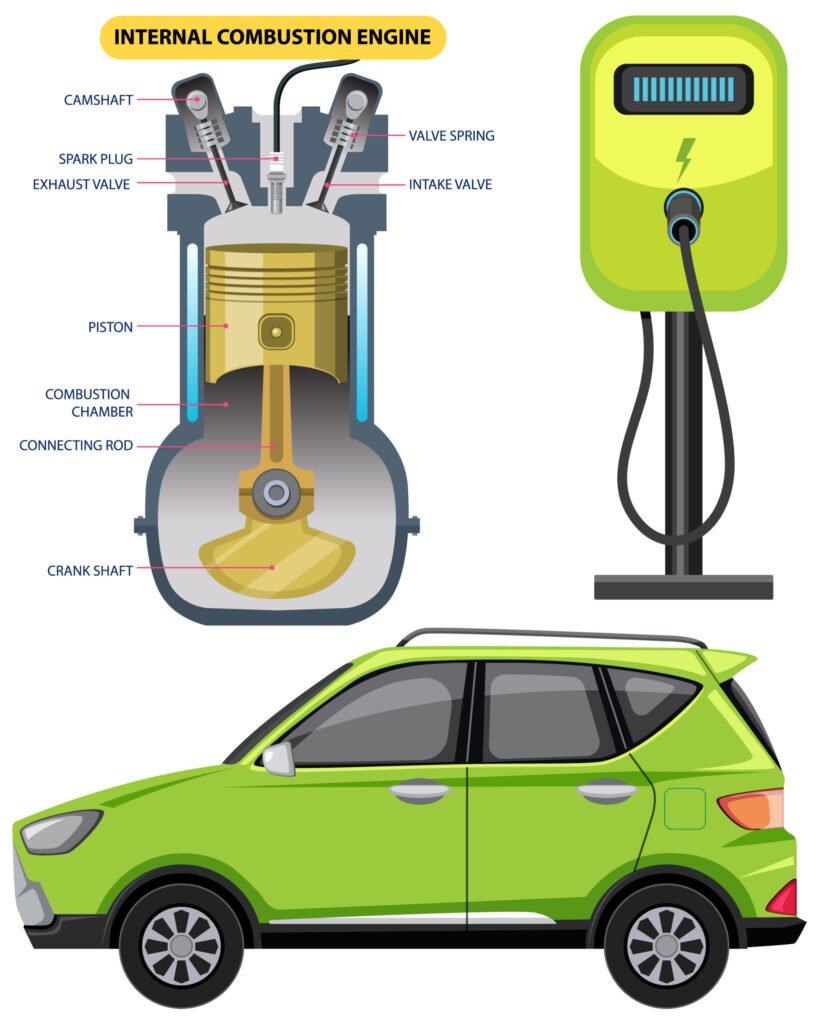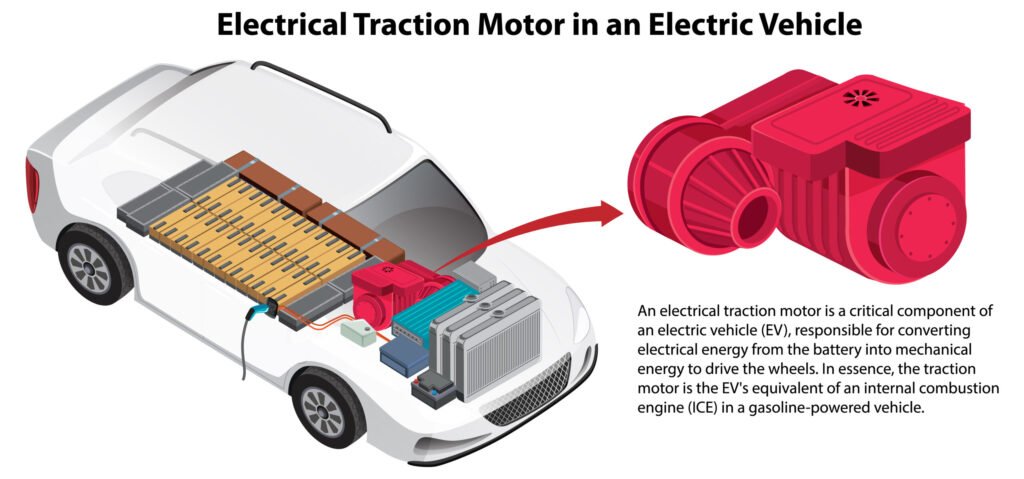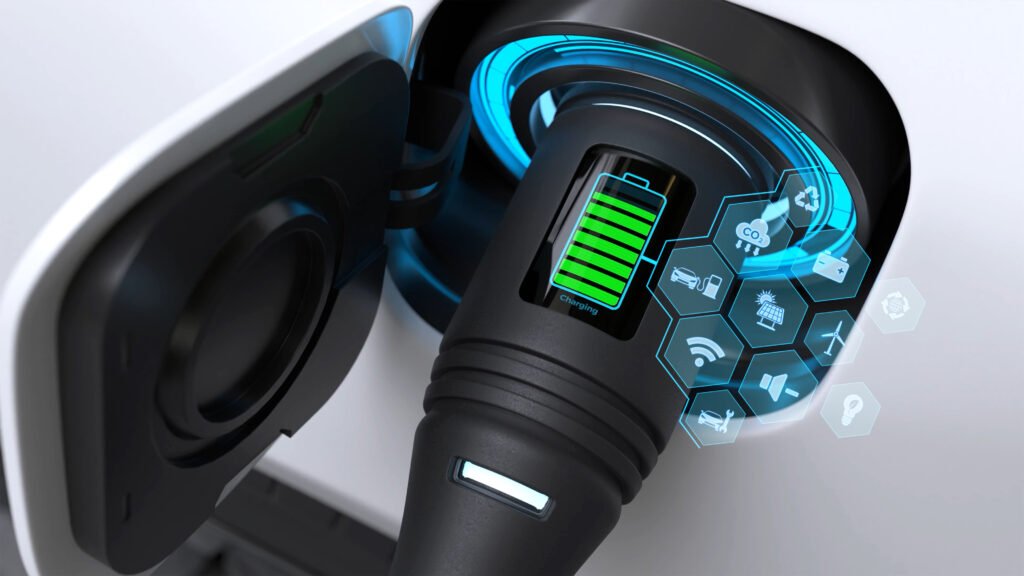Are you considering transforming your traditional vehicle into a more environmentally friendly option? Electric vehicle (EV) conversion is an innovative solution that allows you to upgrade your internal combustion engine to a more sustainable powertrain.

By converting your vehicle, you can significantly reduce your carbon footprint and contribute to a cleaner environment. This process involves replacing the traditional engine with an electric motor, allowing you to enjoy the benefits of EVs without having to purchase a new vehicle.
Key Takeaways
- Understand the basics of electric vehicle conversion
- Learn about the benefits of converting your traditional vehicle
- Discover the key components involved in the conversion process
- Explore the environmental benefits of electric vehicle conversion
- Find out how to get started with converting your vehicle
Understanding Electric Car Motor Conversion Basics
The process of converting a traditional vehicle to an electric vehicle (EV) involves several key components and considerations. This conversion, often referred to as an electric vehicle motor swap, requires a thorough understanding of the vehicle’s current configuration and the desired outcome.
What Is Electric Car Motor Conversion?
Electric car motor conversion involves replacing the internal combustion engine with an electric motor, along with the necessary battery pack and control systems. This ev motor upgrade not only reduces the vehicle’s environmental impact but also potentially improves its performance and reduces operating costs.
Benefits of Converting Your Vehicle to Electric
Converting your vehicle to electric offers several benefits, including:
- Reduced environmental impact due to zero tailpipe emissions
- Lower operating costs, as electricity is generally cheaper than gasoline
- Improved performance, thanks to the instant torque provided by electric motors
Common Misconceptions About EV Conversions
Some common misconceptions about EV conversions include the belief that they are too expensive or complicated. However, with the right guidance and components, an electric vehicle motor swap can be a viable and rewarding project.

Assessing Your Vehicle’s Suitability for Conversion
Not all vehicles are created equal when it comes to electric car motor conversion; assessing your vehicle’s suitability is key.
Ideal Vehicle Types for Electric Conversion
Vehicles with a simple design and less complex engine compartments are generally more suitable for electric motor retrofit. Typically, smaller cars and those with less powerful engines are ideal candidates.
Weight Considerations and Distribution
The weight of the vehicle and its distribution play a significant role in the conversion process. Electric vehicles require careful weight distribution to maintain balance and efficiency. The added weight of batteries must be compensated for to avoid affecting the vehicle’s dynamics.

| Vehicle Type | Weight Consideration | Conversion Suitability |
|---|---|---|
| Small Cars | Less than 2,000 lbs | High |
| Medium Cars | 2,000-3,500 lbs | Moderate |
| Large Cars/SUVs | More than 3,500 lbs | Low |
Space Requirements for Battery Placement
Adequate space for battery placement is crucial. The available space will dictate the number and type of batteries that can be used, directly impacting the vehicle’s range and performance.
Transmission Compatibility Issues
Transmission compatibility is another critical factor. Some electric motor conversions may require specific transmission types or modifications to work efficiently.
Essential Components for Electric Car Motor Conversion
The success of an electric car motor conversion depends on several key components. Understanding these elements is vital to ensure a successful conversion.
Electric Motors: Types and Specifications
Electric motors are the heart of any electric vehicle conversion. There are several types of electric motors available, including DC motors and AC motors. AC motors are more efficient and require less maintenance, making them a popular choice for conversions.
Battery Options and Configurations
Batteries are another crucial component in electric car conversions. The most common types are lead-acid batteries and lithium-ion batteries. Lithium-ion batteries offer higher energy density and longer lifespan but are more expensive.
Controllers and Management Systems
Controllers manage the flow of energy between the battery and the motor, while management systems monitor the overall health of the electric vehicle system. A well-designed controller and management system are critical for efficiency and safety.
Electric Car Motor Conversion Kits
For those new to electric vehicle conversions, kits can simplify the process. These kits usually include the motor, controller, and other necessary components.
Popular Kit Manufacturers
Some well-known manufacturers of electric car motor conversion kits include Hyper9 and EV West. These companies provide comprehensive kits that cater to various conversion needs.
What to Look for in a Quality Kit
When selecting a conversion kit, consider factors such as motor power, battery compatibility, and controller features. A good kit should provide detailed instructions and support.
| Kit Component | Considerations | Importance Level |
|---|---|---|
| Motor | Power output, efficiency | High |
| Battery | Type, capacity, compatibility | High |
| Controller | Features, compatibility with motor and battery | High |
“The right conversion kit can make all the difference in the success of your electric vehicle project.”
— EV Conversion Expert
Complete Electric Car Motor Conversion Process
Converting your vehicle to electric is a complex process that requires careful planning and execution. Understanding the steps involved will help you navigate this journey with confidence.
Planning and Preparation
The first step in the electric car motor conversion process is thorough planning and preparation. This involves assessing your vehicle’s suitability for conversion, sourcing the necessary components, and understanding the legal and regulatory implications. You should also consider the electric vehicle motor conversion cost and how it fits into your budget.
Removing the Internal Combustion Engine
The next step is to remove the internal combustion engine and its associated components. This requires careful disassembly and documentation to ensure that you can reattach or replace components as needed. It’s a labor-intensive process that demands patience and mechanical aptitude.
Installing the Electric Motor
After removing the internal combustion engine, you will install the electric motor. This involves mounting the motor, connecting it to the transmission (if applicable), and ensuring proper alignment. The type of electric motor you choose will depend on your vehicle’s specifications and performance requirements.
Battery Installation and Wiring
Battery installation is a critical step in the conversion process. You need to select a suitable battery type and configuration, install the batteries in the designated space, and wire them to the electric motor and control systems. Safety precautions are paramount during this step to avoid electrical hazards.
Controller Setup and Programming
The controller is the brain of your electric vehicle, managing the flow of energy between the battery and the electric motor. Setting up and programming the controller requires a good understanding of your vehicle’s electrical system and the controller’s specifications.
Testing and Troubleshooting
Once the conversion is complete, thorough testing and troubleshooting are essential to ensure that your vehicle operates safely and efficiently. This involves checking the electrical systems, testing the vehicle’s performance under various conditions, and addressing any issues that arise.
Electric Car Motor Conversion Costs and Budgeting
As you consider converting your car to electric, it’s essential to have a clear understanding of the associated costs. The total expense of an electric car motor conversion can vary significantly based on several factors.
Component Cost Breakdown
The cost of components is a significant portion of the overall expense. This includes the electric motor, batteries, controller, and other necessary parts. The electric motor can range from $1,000 to $5,000, depending on its power and efficiency.
Labor Costs: DIY vs. Professional Installation
Labor costs can vary greatly depending on whether you choose a DIY installation or hire a professional. A DIY approach can save on labor costs but requires significant technical expertise.
Electric Vehicle Motor Conversion Cost Factors
Several factors influence the total cost, including the type of vehicle, the complexity of the conversion, and the cost of components.
Long-term Savings and ROI Considerations
While the initial cost of conversion can be substantial, long-term savings on fuel and maintenance can provide a significant return on investment.
Understanding these costs and factors will help you make an informed decision about converting your vehicle to electric.
Professional Electric Car Conversion Services
For a seamless electric vehicle conversion experience, consider hiring a professional service. Converting your car to electric can be a complex process, involving various technical and logistical challenges. Professional electric car conversion specialists have the expertise to handle these challenges, ensuring a high-quality conversion.
Finding Electric Car Conversion Specialists
To find the right conversion specialist, start by researching local and reputable conversion services. Look for companies with experience in electric vehicle conversions and check their reviews and testimonials. You can also ask for referrals from friends or online forums.
What to Expect from Professional Services
A professional conversion service will assess your vehicle’s suitability for conversion, recommend the best components, and handle the installation. They will also ensure that the conversion meets safety and performance standards.
Questions to Ask Before Hiring a Conversion Expert
Before hiring a conversion service, ask about their experience, the components they use, and their warranty policies. It’s also essential to inquire about their testing and validation procedures to ensure the conversion is done correctly.
Comparing Electric Vehicle Motor Conversion Services
| Service Provider | Experience | Warranty | Cost |
|---|---|---|---|
| ABC Conversions | 5+ years | 2-year warranty | $10,000 |
| XYZ Electric | 3+ years | 3-year warranty | $12,000 |
| Green Motors | 7+ years | 5-year warranty | $15,000 |
By comparing different service providers, you can make an informed decision and choose the best option for your electric vehicle conversion needs.
Conclusion: Is Electric Car Motor Conversion Right for You?
As you’ve explored the process of electric car motor conversion, you’ve likely considered the benefits and challenges. Converting your vehicle to electric can be a cost-effective and environmentally friendly option, but it requires careful planning and execution.
You now understand the essential components, including electric motors, batteries, and controllers, and how they impact the overall cost and performance of your vehicle. Weighing these factors will help you make an informed decision about your vehicle’s future.
Whether you choose to undertake the electric car motor conversion yourself or hire a professional, it’s essential to consider your budget, technical expertise, and local regulations. By doing so, you’ll be able to enjoy the benefits of electric vehicle ownership, including reduced operating costs and a lower carbon footprint.
As the demand for electric vehicles continues to grow, electric car motor conversion is becoming an increasingly viable option for those looking to upgrade their vehicles. With the right information and planning, you can successfully convert your vehicle to electric and join the electric vehicle revolution.
FAQ
What is the typical cost of an electric car motor conversion?
The cost of an electric car motor conversion can vary widely, depending on factors such as the type of vehicle, the electric motor and battery used, and whether you choose a DIY or professional installation. On average, you can expect to pay between $5,000 to $15,000 or more for a conversion, with some high-performance conversions reaching upwards of $30,000.
How long does an electric car motor conversion take?
The time required for an electric car motor conversion can vary significantly, depending on the complexity of the project and the level of expertise involved. A DIY conversion can take several months to complete, while a professional installation may take several weeks to a few months.
What are the benefits of converting my vehicle to electric?
Converting your vehicle to electric offers several benefits, including reduced environmental impact, lower operating costs, and improved performance. Electric vehicles (EVs) produce zero tailpipe emissions, reducing greenhouse gas emissions and air pollution in urban areas.
Can any vehicle be converted to electric?
While many vehicles can be converted to electric, some are more suitable than others. Ideal candidates for electric conversion are typically vehicles with a sturdy frame, sufficient space for battery placement, and a compatible transmission. Factors such as weight distribution and suspension should also be considered.
What kind of maintenance is required for an electric vehicle conversion?
Electric vehicle conversions require less maintenance than traditional internal combustion engine vehicles, as they have fewer moving parts. However, regular maintenance is still necessary, including checks on the battery, electric motor, and controller, as well as the vehicle’s braking and suspension systems.
How do I find a reliable electric car conversion specialist?
To find a reliable electric car conversion specialist, you can start by researching online, asking for referrals from friends or online forums, and checking for certifications or affiliations with professional organizations. It’s also essential to ask potential service providers about their experience, pricing, and warranty offered.
What is an electric car motor conversion kit?
An electric car motor conversion kit is a package that includes the necessary components to convert a traditional internal combustion engine vehicle to an electric vehicle. These kits typically include an electric motor, battery, controller, and other essential components, and can be purchased from various manufacturers.
Can I perform an electric car motor conversion myself?
While it’s possible to perform an electric car motor conversion yourself, it’s a complex project that requires significant technical expertise and specialized tools. If you’re not experienced with electrical and mechanical systems, it’s recommended to seek the help of a professional conversion service.
What are the advantages of using an electric vehicle motor conversion kit?
Using an electric vehicle motor conversion kit can simplify the conversion process, as the components are typically designed to work together seamlessly. Kits can also save time and effort, as they often include pre-assembled components and detailed instructions.






